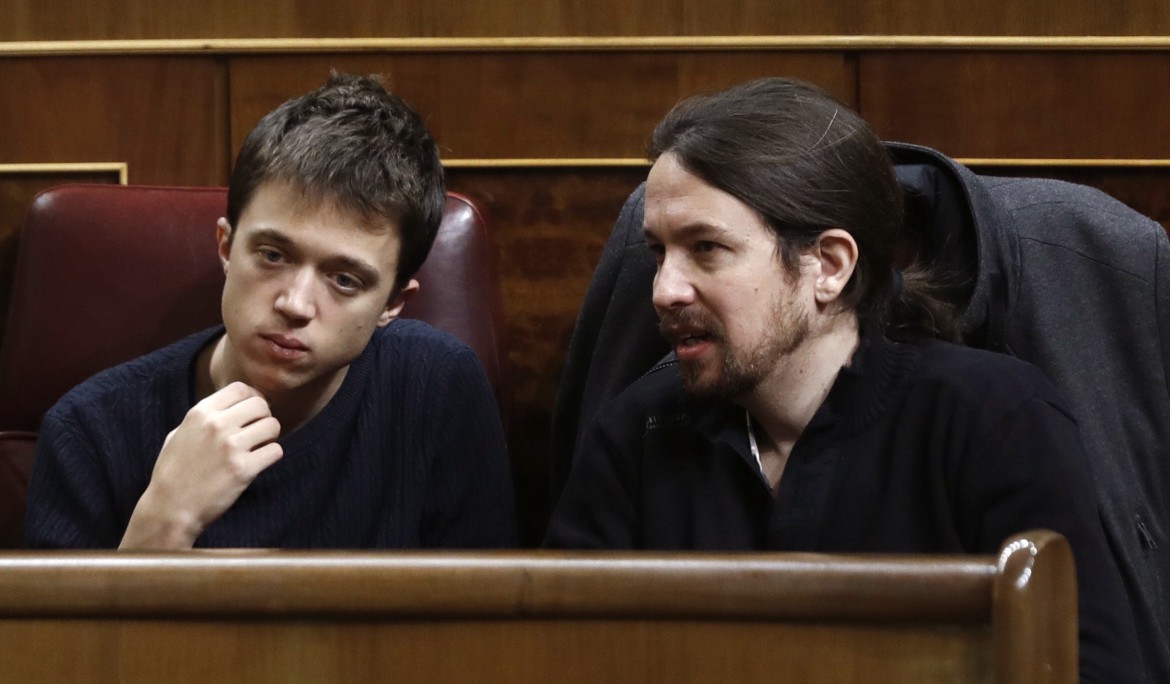Analysis
Errejón surprise candidacy leaves Podemos in crisis
The crisis is explosive because it is not only dividing the deputies in the Madrid regional parliament, but, if Errejón succeeds in his plans, there is a strong possibility that the party will split into two.

No, Podemos no puede. Sadly, this might end up being the epitaph of the Spanish grassroots progressive party. Just a few days away from the fifth anniversary of the movement started by the heirs of the indignados/Movimiento 15-M, Íñigo Errejón, the former number two to the party leader, Pablo Iglesias—who beat him in a no-holds-barred fight for the party leadership two years ago—has set off a political bombshell that will almost certainly end up tearing the party apart, just four months away from the crucial elections in May.
Here’s a short summary of the intricate series of events that got us to this point. In May, in Madrid (as in the rest of Spain), voters will go to the polls not only for the European Parliament elections, but also to elect the new municipal government and the new regional government (the Community of Madrid). In the city of Madrid, the powerful left-wing mayor, Manuela Carmena, has already made it clear that she doesn’t want to have her hands tied by any political party—including Podemos and Izquierda Unida.
During her current mandate, she ousted the budget commissioner (from the IU) and clashed head-on with Podemos. Wanting to have full authority over who will run on the same list as her and who will form her team, she has set up her own political platform, Más Madrid, to which she is only willing to accept former Podemos members who pledge loyalty to her. This has led to a number of city council members leaving Podemos in order to stand with the mayor at the upcoming elections.
The regional government of the Community of Madrid, however, is still controlled by the right-wing PP (due to a one-vote majority in the regional parliament, in alliance with Ciudadanos). After the life-and-death struggle for the Podemos leadership was over, Iglesias had decided (with the support of the party grassroots) that Errejón would stand as Podemos’ candidate (in alliance with the IU) for the government of the Community of Madrid. In that scenario, Errejón would have competed with the Socialist candidate, Ángel Gabilondo, a former minister in the Zapatero government, for the leadership of the left, and they would have probably ended up allies in the regional government.
For background: in the last elections, IU-Madrid, decimated by an intra-party schism and running alone, was unable to surpass the 5 percent threshold, and, as a result, its 4-odd percent of votes came to naught (and ended up helping the PP put together a majority after redistribution).
This was the state of play until a few days ago, when Errejón blew up all the best-laid plans. It turned out that unbeknownst to his party, he had been secretly negotiating a joint ticket with Manuela Carmena, which would have had him join her platform: she would run for mayor while he would run for the regional government. Errejón now claims that he was working to make it possible for the Madrid branch of Podemos to join Carmena’s platform as a whole (which would be similar to the situation in Catalonia, with Ada Colau’s En comú podem).
However, once the initial shock blew over, Iglesias (who has just handed over the reins to Irene Montero, as he is going on paternity leave for the next six months) has said, in unison with other Podemos leaders, that Errejón is out of the party. At the same time, they added that, while Podemos was willing to take a step back and not run a candidate for the municipal elections in Madrid (rejecting the possibility that the party would join Más Madrid), they would certainly run their own candidate (against Errejón) for the regional government.
The crisis is an explosive one, because it is not only dividing the deputies in the Madrid regional parliament, but, if Errejón succeeds in his plans, it will most likely reverberate throughout the country. There is a strong possibility that the party will split into two. While, at the level of the Madrid region, fragmentation isn’t necessarily something that puts parties at a serious disadvantage (except for the issue of the electoral threshold), a split could have disastrous consequences for the left at the national level, where the electoral system benefits larger parties. It appears that the trigger for the current crisis was the regional elections in Andalusia, where—continuing a trend that has been ongoing since 2015—Podemos, in alliance with Izquierda Unida, lost votes (or its voters didn’t show up).
The crisis in Podemos has never been more acute. Those who famously planned on “storming Heaven” are now fourth in the polls, after the PSOE, PP and Ciudadanos. The Pablo Iglesias-Irene Montero duo has been uninspiring at the head of the party, and in many local communities there are problems getting good candidates out of the primaries. After Xavier Domenech threw in the towel, the Catalonia branch is again without a leader, and many other local party organizations—such as Galicia—are facing a leadership crisis. In Madrid, Errejón’s maneuvering has raised up a storm of discontent, and his surprise move has destroyed the party’s precarious equilibrium.
The IU—which remains in the alliance with Podemos for now—may ultimately run their own candidate for the Madrid municipal elections, and are currently pondering the best course of action for their local organization. For their part, the Socialists fear that the earthquake that is shaking up their current allies will have a negative impact on the fate of Sánchez’s government. What is certain is that after May 26, Podemos will enter a new phase—and it may well be a painful one.
Originally published at https://ilmanifesto.it/crisi-podemos-errejon-a-sorpresa-corre-con-la-sindaca-carmena/ on 2019-01-20
